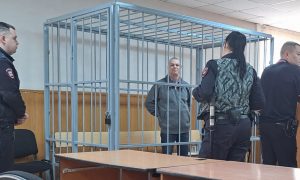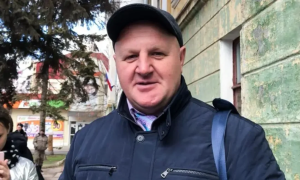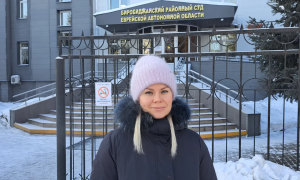Jehovah’s Witnesses Igor Yefimov and Aleksei Nikolaev, arrested in Chuvashia on 26 July, have been ordered held in continuing pre-trial detention until late September. “This is the first time in contemporary Russia that a court has ordered any of our people to be held in detention simply because they are Jehovah’s Witnesses,” Jehovah’s Witness spokesperson Grigory Martynov told Forum 18 News Service. Prosecutors tried to have three others imprisoned as they await trial on “extremism”-related charges. “The accusation that he created an extremist group is absurd,” Yefimov’s wife Marina complained to Forum 18. In Chelyabinsk, three local Muslim women are due to go on trial on 6 September on “extremism”-related criminal charges. “We’re not extremists – indeed, we’re against extremism and against violence,” one of the accused, Farida Ulmaskulova, insisted to Forum 18. “Islam bans the killing of oneself or others.”A court in the Chuvash Republic, on the River Volga west of Kazan, has ordered two Jehovah’s Witnesses arrested on 26 July to remain in pre-trial detention until 25 and 26 September. “This is the first time in contemporary Russia that a court has ordered any of our people to be held in detention simply because they are Jehovah’s Witnesses,” spokesperson Grigory Martynov told Forum 18 News Service from the Jehovah’s Witness headquarters near St Petersburg on 29 August. The two – Igor Yefimov and Aleksei Nikolaev – are among five local Jehovah’s Witnesses facing criminal prosecution on “extremism”-related charges. No date for any trial has yet been set.
In Chelyabinsk east of the Urals, three local Muslim women are due to go on trial on 6 September on “extremism”-related criminal charges, the court told Forum 18. The case had been opened against them in August 2011. The three read the works of the late Turkish Muslim theologian Said Nursi.
Jehovah’s Witnesses and readers of Nursi’s works are particular targets of anti-“extremism” raids and prosecutions. Nurdzhular – a movement which Nursi readers insist does not exist – was banned by Russia’s Supreme Court in 2008. The Jehovah’s Witness community in Taganrog was banned in 2009 as “extremist”. Numerous Jehovah’s Witness publications and works by Nursi are among more than 100 bona fide religious publications banned through the courts and placed on the Justice Ministry’s Federal List of Extremist Materials (see Forum 18’s Russia “Extremism” religious freedom survey http://www.forum18.org/Archive.php?article_id=1724).
Long investigations
Despite long investigations and often lengthy trials – many of which involve the FSB security service and Police Anti-Extremism Centres – few cases against religious believers on “extremism”-related charges end up with convictions, and even fewer with prison terms.
Of 18 Nursi readers and Jehovah’s Witnesses whose “extremism”-related trials are known to have been completed, five (all Nursi readers) ended with prison terms, five (all Nursi readers) ended with suspended sentences, two (both Jehovah’s Witnesses) ended with community service orders, two (both Jehovah’s Witnesses) ended in acquittals, while the trial of four (all Nursi readers) ran out of time before any verdict was reached. However, trials and investigations against others continue (see F18News 6 June 2012 http://www.forum18.org/Archive.php?article_id=1709).
Officials are sometimes reluctant to defend their actions to Forum 18 in “extremism”-related cases against religious communities.
Pre-trial detention
Yefimov and Aleksei Nikolaev were among four Jehovah’s Witnesses detained in Chuvashia as part of a criminal investigation on 26 July. The four were detained for 48 hours, which was extended until 30 July. While Yefimov and Aleksei Nikolaev were then ordered held in continuing detention, different judges rejected similar moves to have Andrei Nikolaev (not apparently related) and Andrei Martynov – as well as another community member Oleg Marchenko – held in pre-trial detention (see F18News 31 July 2012 http://www.forum18.org/Archive.php?article_id=1727).
In separate hearings under different judges on 10 August, Chuvashia’s Supreme Court in the regional capital Cheboksary rejected the prosecutor’s appeals against the decisions not to hold the three men in pre-trial detention, the court website notes.
On 9 August the Supreme Court overturned the lower court decision approving the prosecutor’s request to have Yefimov and Aleksei Nikolaev held in pre-trial detention. The Supreme Court ordered the lower court to hear the requests again, the court website notes.
However, on 23 August Judge Tatyana Stolyarenko of Cheboksary’s Moscow District Court upheld the detention of Yefimov, ordering that he be held in detention until 26 September. The following day, Judge Bela Kapitonova of the same court upheld Aleksei Nikolaev’s detention, ordering that he be held until 25 September.
“Especially Important Cases”
All five Jehovah’s Witnesses – including Yefimov and Aleksei Nikolaev – are facing prosecution under Criminal Code Article 282, Part 2, Point C; Article 282.1, Part 1; and Article 282.1, Part 2. The case against them is being led by Aleksandr Sotnikov, Investigator of Especially Important Cases at the Department for Investigating Especially Important Cases of the Chuvash Investigation Committee.
Asked whether the streets of Cheboksary were safer now that the two Jehovah’s Witness “extremism” suspects had been detained in pre-trial detention, Investigator Sotnikov refused to respond, merely insisting that the court had taken the decision to imprison them. He told Forum 18 on 29 August that he was unable to say when the trial would begin, noting that the investigation is “still underway”. He refused to answer any further questions and put the phone down.
Called back, his colleague said Sotnikov had just left. The colleague – who did not identify himself – refused to tell Forum 18 how important local Jehovah’s Witnesses are in the range of “especially important cases” the Department is currently handling.
He “never hated anyone”
Yefimov’s wife Marina says she is still in shock that her husband has been imprisoned. “We’ve been married twenty years,” she told Forum 18 from their home in Novocheboksarsk on 30 August. “He’s a good man who has never hated anyone. The accusation that he created an extremist group is absurd.”
Marina Yefimova said her husband, who marked his 46th birthday on 14 August, is suffering in the pre-trial investigation prison. “Everyone smokes and he has a bad heart,” she complained to Forum 18. She said she has only been able to see him four times since his 26 July arrest, only at court hearings. She said she could apply to visit him in prison. “But you need the investigator’s permission for this. I haven’t asked as I don’t want to have to see him in those conditions. I had hoped he would be freed.”
She worries that the case could drag on for months or years “and all this time he could be held in detention”.
Yefimova pointed out that 39-year-old Aleksei Nikolaev’s parents are also suffering. “Aleksei is not married, and his parents are elderly. They’re in shock that their son can be taken for no reason.”
Trial imminent
Three Muslim women are due to go on trial under Judge Lyubov Borzova at Chelyabinsk’s Lenin District Court on 6 September, the court chancellery for criminal cases told Forum 18 on 30 August. The three – Farida Ulmaskulova, Gulnaz Valeyeva and Venera Yuldasheva – all read Said Nursi’s works. They are being tried under Criminal Code Article 282.2, Part 2 and Article 282, Part 1. The case appears on the court website with the note “closed information”, without the names of the defendants and without the Criminal Code Articles being listed.
Ulmaskulova said she had been summoned to court that day to be given the notice of trial, she told Forum 18 from Chelyabinsk on 30 August. “I don’t know how long the trial will last or how it will proceed,” she said. “I have never been on trial before.”
The case was prepared by Chelyabinsk Regional Prosecutor’s Office. The three women have not been held in pre-trial detention, but have had to sign statements that they would not leave town and would behave well. Yuldasheva also had to sign a statement not to reveal details of the case, friends of the women told Forum 18.
“We’re not extremists”
The case was launched after raids in August 2011 – during the Muslim holy month of Ramadan – on a summer home in a village in Kurgan Region where Ulmaskulova was teaching Islam to seven girls. Almost simultaneously, Ulmaskulova’s and Valeyeva’s homes in Chelyabinsk were raided. Religious books and other items were confiscated (see F18News 12 January 2012 http://www.forum18.org/Archive.php?article_id=1654).
A 3 August statement on the Regional Prosecutor’s Office website accused the women “under the guise of studying the basics of Islam, Arabic and Turkish” of organising lessons in rented flats in Chelyabinsk and Kurgan Region between 2009 and 2011. “In reality they familiarised parishioners with extremist literature from the collected works Risale-i Nur [“Messages of Light”] by Said Nursi, drawing the population into the activity of a banned religious association, forming a positive acceptance of death and a readiness to self-sacrifice in the name of the interests of the teaching. In addition, during lectures two of the accused publicly called citizens to enmity and hatred on the basis of ethnicity and attitude to religion.”
The Prosecutor’s Office said the “criminal activity of the members of the extremist organisation” had been “unmasked and halted” by the Regional Police’s Anti-Extremism Centre.
Ulmaskulova vigorously rejects the Prosecutor’s Office accusations. “We did nothing of that,” she insisted to Forum 18. “We’re not extremists – indeed, we’re against extremism and against violence. Islam bans the killing of oneself or others.” She also complained that the books and telephones confiscated in the 2011 raids have still not been returned.
Ulmaskulova said they had been represented by the Izhevsk-based human rights lawyer Rustem Valiullin. However, he drowned while swimming in a river in June. Their new lawyer is Tamara Gurova.
Transferred yet again
Meanwhile, the forthcoming criminal trial of an Orenburg-based Muslim Ramil Latypov has been transferred yet again, this time to a Magistrate at Judicial Unit No. 4 in the city’s Lenin District, an official of Lenin District Court told Forum 18 on 30 August.
The 25-year-old Latypov is a reader of Nursi’s works. The case against him was launched in 2010, a year after he with other Nursi readers was raided by Orenburg’s Organised Crime Police and the FSB security service (see F18News 16 July 2009 http://www.forum18.org/Archive.php?article_id=1328).
Latypov is facing trial under either Article 282.1, Part 1 or Article 282.2, Part 1. The trial had been expected to begin in June, but the case has been transferred from one local court to another (see F18News 31 July 2012 http://www.forum18.org/Archive.php?article_id=1727).
On 22 August, Judge Viktor Afanaskin of Orenburg’s Lenin District Court upheld the prosecutor’s suit for the case not to be heard at the city’s Central District Judicial Unit No. 5. Instead, the case was handed to Lenin District’s Judicial Unit No. 4. Officials of Judicial Unit No. 4 told Forum 18 on 30 August that the case has not yet arrived there. They said the transfer decision goes into force ten days after its adoption, and would not expect any case to arrive until after then.
Extremism Articles
Criminal Code Article 282, Part 1 (“Actions directed at the incitement of hatred [nenavist] or enmity [vrazhda], as well as the humiliation of an individual or group of persons on the basis of .. attitude to religion, .. conducted publicly or through the media”) carries a maximum punishment of two years’ imprisonment.
Article 282, Part 2, Point C (“incitement of ethnic, racial or religious hatred by an organised group”) carries a maximum punishment of five years’ imprisonment.
Article 282.1, Part 1 (“creation or leadership of an extremist organisation”) carries a maximum punishment of four years’ imprisonment.
Article 282.1, Part 2 (“participation in an extremist organisation”) carries a maximum punishment of two years’ imprisonment.
Article 282.2, Part 1 (“Organisation of the activity of a social or religious association or other organisation in relation to which a court has adopted a decision legally in force on liquidation or ban on the activity in connection with the carrying out of extremist activity”) carries a maximum punishment of three years’ imprisonment.
Article 282.2, Part 2 (“Participation in the activity of a social or religious association or other organisation in relation to which a court has adopted a decision legally in force on liquidation or ban on the activity in connection with the carrying out of extremist activity”) carries a maximum punishment of two years’ imprisonment. (END)
http://www.forum18.org/Archive.php?article_id=1736





